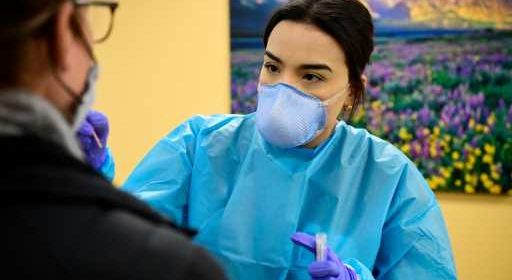COVID in Colorado : State urges normality now, prepares for possible winter wave

Two years into the COVID-19 pandemic, the situation is looking relatively bright in Colorado, though state health officials said Friday they’re making plans in case the virus deals yet another setback.
Colorado confirmed its first COVID-19 cases two years ago Saturday, though it’s likely the coronavirus already was circulating in the state at that point. Since then, the virus has infected about 1.3 million people in Colorado, hospitalized more than 60,000 and killed more than 12,500.
New cases and hospitalizations are continuing to trend down because so many people are at least temporarily immune following the sky-high wave of infection caused by the virus’s omicron variant, said Jill Hunsaker Ryan, executive director of the Colorado Department of Public Health and Environment.
“Case counts have decreased to levels not seen since last summer,” she said at a news conference Friday. “If you are vaccinated and boosted, go live your lives.”
It’s not clear how long that immunity will last, though, particularly in people who aren’t vaccinated, Ryan said. The state health department is making plans to scale up its response again if the virus unleashes another wave this fall or winter, she said.
Emily Travanty, director of the state’s public health lab, said they have partnerships with 43 wastewater systems to monitor the overall amount of the virus circulating in those communities, and to look for new variants. That covers about 55% of the state’s population, and they’re working to set up new partnerships to monitor other parts of the state, she said.
While wastewater sampling is useful in detecting asymptomatic cases, it’s still a good idea to go get tested if you’re feeling sick, said Dr. Eric France, Colorado’s chief medical officer. That gives the state additional data about how the virus is spreading, he said.
“We know that COVID-19 is going to be with us for the foreseeable future,” he said. “I think it’s all of our duty to be looking for new COVID cases.”
The health care system will gradually take over much of the responsibility for testing people and vaccinating against the virus, as it does with other diseases, said Scott Bookman, the state’s COVID-19 incident commander.
But the state will continue to have a role in encouraging more people to enter the health care workforce, responding to outbreaks in high-risk facilities like nursing homes, bringing the vaccine to hard-to-reach communities, and stockpiling protective equipment and testing supplies in case another surge hits, he said.
“We will continue to prepare for what the future may hold,” he said.
Source: Read Full Article